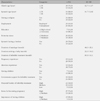Abstract
Methods
The process included construction of a conceptual framework, generation of 12items, verification of content validity, selection of secondary items, verification of construct validity and extraction of final items. In order to verify the reliability and validity of the preliminary instrument, data were collected from 50 infertile women in an In Vitro Fertilization (IVF) clinic. Data were analyzed by item analysis, Varimax factor analysis and Cronbach's alpha.
Results
There were 10 items in the final instrument categorized into 2 factors labeled as "personal (6 items)" and "relational (4 items)" The total variance explained was 73.36%. The instrument was shown to have good reliability with a Cronbach's alpha of .899.
Conclusion
Validity and reliability of the scale were confirmed in this study showing its utility to measure uncertainty for infertile women. The instrument can help understand sterility and accurately measure uncertainty for infertile women. The instrument can also be used to evaluate nursing interventions designed for mitigating uncertainty for infertile women.
Figures and Tables
References
1. Bae K.J., Ro S.O., Kim J.A. The study of loneliness in infertile women. Journal of Korean Academy of Nursing. 1999. 29(6):1379–1391.
2. Burns L.H., Covington S.N. Infertility counseling: A comprehensive handbook for clinicians. 1999. New York: Parthenon.
3. Cho J.J. Biotechnology and women's behavior: between test-tube baby and a study on cloning embryos. Journal of Science & Technology Studies. 2005. 5(1):93–123.
4. Cho N.O., Park Y.S. Socio-cultural mechanism of infertile women's experience and nursing. Korean Journal of Women Health Nursing. 1996. 2(2):191–202.
5. Covington S.N., Burns L.H. Infertility counseling: A comprehensive handbook for clinicians. 2006. 2nd ed. New York: Cambridge University Press.
6. Cousineau T.M., Domar A.D. Psychological impact of infertility. Best practice & research. Clinical obstetrics & gynaecology. 2007. 21(2):293–308.
7. Daniluk J., Mitchell J. Themes of hope and healing: infertile couples' experiences of adoption. Journal of Counseling and Development. 2003. 81(4):389–399.
8. Domar A.D. The mind/body connection: The boston IVF handbook of infertility. 2007. Boston: Informa Healthcare.
9. Gibson D.M., Myers J.E. The effect of social coping resources and growth-fostering relationships on infertility stress in women. Journal of Mental Health Counseling. 2002. 24:68–80.
10. Gerrity D.A. A biopsychosocial theory of infertility. The Family Journal. 2001. 9(2):151–158.
11. Hilton B.A. The uncertainty stress scale: Its relevance to life-threatening and chronic illness. Critical Care Nurse. 1994. 12(2):70–73.
12. Hirsch A.H., Hirsch S.M. The effect of infertility on marriage and self-concept. Journal of Obstetric, Gynecologic, and Neonatal Nursing. 1989. 18(1):13–20.
13. Han H.S. A study on korean women infertility experiencing: grounded theory approach. 2003. Seoul: Ewha Womens University;Unpublished doctoral dissertation.
14. Hwang S.S. A grounded theory approach to the experience of infertile woman. 2000. Seoul: Hanyang University;Unpublished doctoral dissertation.
15. Cheong B.J., Lee S.H., Pai D.H., Kie B.S. A study on psychological strain in IVF. Korean Journal of Obstetrics and Gynecology. 1993. 36(6):800–801.
16. Kang H.S., Kim M.J. Experiences of infertile women in unsuccessful In Vitro Fertilization (IVF). Korean Journal of Women Health Nursing. 2004. 10(2):119–127.
17. Kim H.J. The stress of the infertile women in IVF treatment. 1999. Seoul: Hanyang University;Unpublished master's thesis.
18. Kim S.H. Data analysis of epidemiology of infertility: 2002~2006 National Health Insurance Corporation, The Donga. 2007. 08.
http://www.donga.com/fbin/output?n=200708250004.
19. Kwon K.S. A study on psychological and social issues of sterile women: principally based on a medical social work approach. 2004. Seoul: Chung-Ang University;Unpublished master's thesis.
20. Knapp T.R., Brown J.K. Ten measurement commandments that often should be broken. Research in Nursing & Health. 1995. 18:465–469.
21. Lynn M.R. Determination and quantification of content validity. Nursing Research. 1986. 35:382–385.
22. Mishel M.H. The measurement of uncertainty in illness. Nursing Research. 1981. 30(5):258–263.
23. Mishel M.H. Uncertainty in illness. Image--the journal of nursing scholarship. 1988. 20:225–232.
24. Mishel M.H., Braden C.J. Finding meaning: Antecedents of uncertainty. Nursing Research. 1988. 37:98–103.
25. Nunnally J.C. Psychometrictheory. 1978. 2nd ed.New York: McGraw-Hill.
26. Park H.S., Park E.S., Kang I.S. Nursing research methodology. 2000. Seoul: Jeongdam Publishing Company.
27. Park Y.J. The experience of the infertile women. 1993. Seoul: Yonsei University;Unpublished doctoral dissertation.
28. Sherrod R.A. Give me children or I'll die. Easing the spiritual pain of infertility. Journal of Christian Nursing. 1999. 16(3):30–33.
29. Tabachnick B.G., Fidell L.S. Using multivariate statistics. 1996. New York: HarperCollins.
30. Yi M.S., Lee S.W., Choe M.A., Kim K.S., Kim Y.M. Experience of Mothers with babies by in vitro fertilization. Journal of Korean Academy of Nursing. 2001. 31(1):55–67.
31. Weaver S., Clifford E., Hay D., Ronibson J. Psychosocial adjustment to unsuccessful IVF and GIFT treatment. patient Education and Counseling. 1997. 31:7–18.




 PDF
PDF ePub
ePub Citation
Citation Print
Print






 XML Download
XML Download